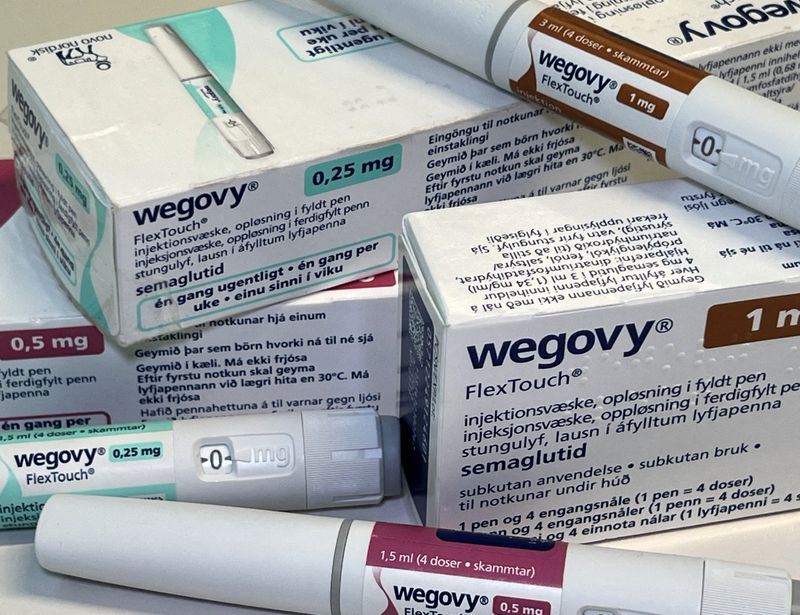By Deena Beasley
(Reuters) -Powerful weight-loss drugs are expanding use of U.S. health care as patients starting prescriptions are diagnosed with obesity-related conditions or take the drugs to become eligible for other services, health records and discussions with doctors show.
An exclusive analysis of hundreds of thousands of electronic patient records by health data firm Truveta found slight, but measurable, increases in first-time diagnoses of sleep apnea, cardiovascular disease, and type 2 diabetes within 15 days of an initial prescription for a GLP-1 weight-loss drug between 2020 and 2024.
In addition to obesity-related conditions, some patients are being prescribed the drugs to lose weight and become eligible for services, including organ transplants, fertility treatments or knee replacements, according to interviews with seven doctors and five other health experts.
"This is a population that previously felt stigmatized by health care providers and often didn't return. But now that they're actually seeing themselves get healthier, asking clinicians questions and engaging more, I do think we're seeing new patients," said Dr. Rekha Kumar, a New York endocrinologist and obesity medicine specialist.
Novo Nordisk (NYSE:NVO)'s Wegovy and Ozempic and Eli Lilly (NYSE:LLY)'s Zepbound and Mounjaro have been shown to lead to average weight loss of at least 15%.
Andrew Friedson, director of health economics at the Milken Institute and three other experts said the impact of the drugs on overall healthcare use is not yet clear. The new diagnoses could mean higher initial spending, but early detection could save costs down the line, he said.
Dr. Courtney Younglove, an obesity medicine specialist and founder of Heartland Weight Loss clinic in Overland Park, Kansas, said she has referred obesity patients for long-delayed pap smears and other routine care, including colonoscopies. Many overweight patients avoid doctors and routine tests for years due to the stigma and bias they often encounter, she said. “A lot of people with obesity don't do a lot of preventive health maintenance."
'THE COURAGE TO ASK'
Phil, a 43-year-old Chicago technology executive who asked for his full name to be withheld for privacy reasons, generally avoided doctors before receiving a GLP-1 prescription from a telehealth provider in early 2023.
He said he told his regular physician about the medication months later, after he had lost more than 30 lbs, and was taken aback by her supportive response. He decided then to advocate more for himself and ask for help with other conditions, including addiction and mental health.
"It gave me the courage to ask," he said.
The Truveta analysis found that for every 1,000 patients with a first-time GLP-1 prescription, 42 were diagnosed with type 2 diabetes within 15 days in 2024, up from 32 in 2020. Over the same period, the number of sleep apnea diagnoses per 1,000 patients rose to 11 from 8 and the number of cardiovascular disease diagnoses increased to 15 from 13.
The most obese patients were twice as likely as people who were less overweight to receive a type 2 diabetes diagnosis, and three times as likely to be diagnosed with sleep apnea, the Truveta data showed.
The analysis was based on 33,630 first-time GLP-1 prescriptions for overweight or obese patients in 2020 and 224,496 in the first 10 months of 2024.
Lilly declined to directly comment on the data, saying in an emailed statement "it is important that adults living with obesity receive appropriate diagnosis and access to evidence-based care."
Novo Nordisk also declined to comment directly, noting its aim "to address unmet needs for a wider range of patients."
QUALIFYING FOR SURGERIES
ResMed, which sells sleep apnea devices, had revenue growth of 11% for its fiscal year ending in June - a trend the company attributed in part to the GLP-1 drugs.
The medications are "bringing people into primary care like never before," ResMed CEO Michael Farrell said at the company's recent shareholder meeting.
A Truveta analysis earlier this year found that since 2020 people were being started on GLP-1s despite having less severe markers of disease, including BMI, which suggested the drugs are becoming more broadly used as preventative tools.
In addition to treatment of things like sleep apnea, the weight-loss drugs could lead to more joint replacements, said Sara Mallatt, director of healthcare research at market analysis firm AlphaSense.
"As people's BMIs come down, they'll be eligible for surgeries they wouldn't otherwise," she said. "No one is saying this is happening in a meaningful way right now, but we think it will."
University of Chicago Medicine last year launched a weight-loss clinic aimed at helping prospective organ transplant patients lose weight to qualify for surgery, with the GLP-1 drugs playing a key role.
"Before they had a place to send these patients, which is our clinic, the scheduler would just say, 'hey, what's your weight, what's your height, what's your BMI,' and if they didn't fit their criteria, they would just tell them to lose weight on their own," said Anesia Reticker, the center's clinical pharmacist specialist.
Retired Indiana steelworker Bensabio Guajardo, 68, was prescribed Ozempic at the clinic in 2023 when he was deemed too obese for a double lung transplant needed to keep him alive after pulmonary fibrosis made breathing increasingly difficult.

"It helped me a lot. It took my cravings away," Guajardo said. After losing around 90 pounds and stopping the drug ahead of a successful surgery in May, his doctor put him back on it to control high blood sugar.
Reticker said the program has received about 100 referrals over the past year from transplant centers in the Chicago area.
